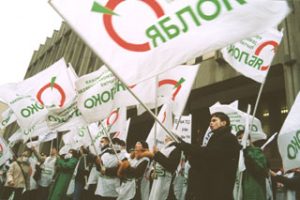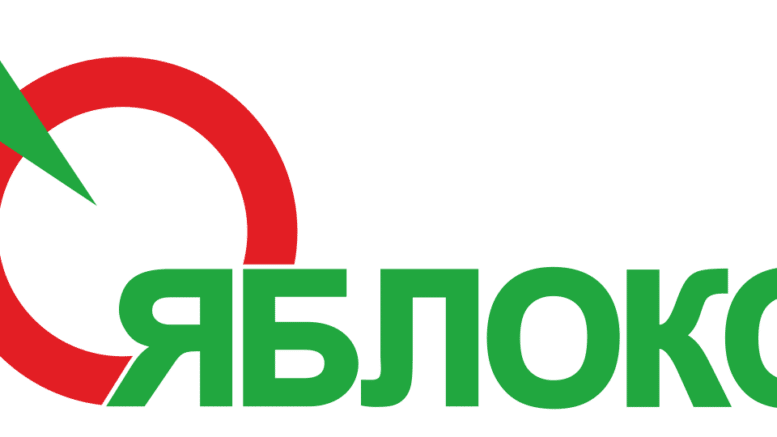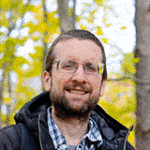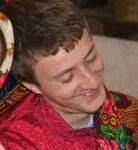Most western observers put substantial hope in Yabloko during the 1990s. Yabloko was an early, strongly pro-West, pro-democracy party that also strongly opposed Yeltsin’s administration. It was, thus, seen as a possibly second party from which to form a strong, competition-based, democratic political system in Russia.
However, Yabloko’s political niche was never very large. They won just 8% of the vote in 1993 and that number has gone down with each passing year. In 2007, they took just 1.6%, although there were a considerable number of allegations about voting irregularities that year.
Yabloko, was formed in 1993 from a union of three leading democratic politicians, Grigory Yavlinsky, Yuri Boldyrev, and Vladimir Lukin and the factions they controlled. The name “Yabloko,” which means “apple” in Russian, was actually formed from the first letters of each of the leader’s last names (Ya-B-L). Most analysts assumed that Yabloko would need to keep negotiating mergers in order to strengthen and solidify its position.

A political protest held by Yabloko supporters in 2004, a few months after losing their representation in the Duma.
However, just a year after it was formed, Vladimir Lukin and his Republican Party left Yabloko. Furthermore, except for a two successful joint ventures at forming a political block with Boris Nemtsov’s Union of Right Forces, it never merged with another party.
Nearly all liberal parties in Russia, including the Union of Right Forces, have shared the same fate, often opening with reasonably high numbers in 1990s and then seeing those numbers dwindle afterwards. There is little question that the government’s conscious efforts to “consolidate” the Russian political field have worked to accelerate this process. However, it must also be realized that most Russians are conservative in their political views and adhere to statist, communist, socialist, or nationalist philosophies.
To its favor, however, Yabloko is the last of the liberal democratic parties from that time still functioning today.
Below is one of Yabloko’s most recent political documents “On a New Political Course,” which largely confirms the values that have been at Yabloko’s core since its foundation and can also be seen in its official political platform.
| О новом политическом курсе | On A New Political Course |
| // Решение Федерального Совета,08.11.2010 | // Decision of the Federal Council, 08.11.2010 |
| Федеральный совет Российской объединённой демократической партии “ЯБЛОКО” считает ключевой политической задачей достижение качественных эволюционных изменений в политической и экономической системе России. | The Federal Council of the Yabloko United Russian Democratic Party believes the key political task ahead is in achieving qualitative, evolutionary changes in Russia’s political and economic system. |
| Мы подтверждаем верность принципам и целям, заявленным в программе партии “ЯБЛОКО” – Демократическом манифесте. Строительство современного демократического социального государства европейского типа, выражающего интересы гражданского общества и контролируемого им – единственно возможное направление развития России. | We affirm our commitment to the principles and goals stated in the Yabloko party program, a democratic manifesto. Construction of a modern, social, democratic, European-type government, which represents the interests of civil society and is controlled by them, is the sole possible course for Russia’s development. |
| Иной реальной стратегии для сохранения и развития России нет. | There is no other real strategy for preservating and developing Russia. |
| Сегодня, за видимым относительным благополучием, накапливаются факторы торможения и разрушения, работающие на дальнейшее отставание страны. | Today, behind the apparent relative prosperity, elements of deceleration and destruction are accumulating, working to further hold the country back. |
| Главной особенностью сложившейся в России политической системы является ОТСУТСТВИЕ РАВЕНСТВА ГРАЖДАН СТРАНЫ ПЕРЕД ЗАКОНОМ как основополагающего элемента современного демократического правового государства. | The main characteristic of Russia’s current political system is the LACK OF EQUALITY OF COUNTRY’S CITIZENS BEFORE THE LAW as an essential element of a modern, democratic, legal state. |
| Неправовой характер государства – системная причина запаздывающего развития России в ХХI веке. Власть в России бесконтрольна. Она не контролируется ни парламентом, ни судебной системой, ни прокурорскими структурами, ни общественностью. | The lawless character of the state is the systemic reason that Russia’s development has lagged in the twenty-first century. The government in Russia is out of control. It’s controlled by neither the parliament, the legal system, the prosecutor’s offices, nor society. |
| В России сегодня нет реального горизонтального и вертикального разделения властей, которое является одним из главных принципов и механизмов современного государства. | Russia today has no real horizontal or vertical separation of powers, which is one of the main principles and mechanisms for a modern state. |
| В ходе реформ 90-х произошел отказ от выращивания полноценного среднего класса и необходимые для этого ресурсы были направлены на формирование совсем другой социальной группы – сверхкрупных собственников, органически связанных с властью – олигархии. | During the reforms of the 90’s, the middle class was not allowed to fully form. The resources necessary for that were directed to the formation of an entirely different social group, the super rich, those inherently tied to the government, the oligarchy. |
| Значительная часть важнейших рычагов управления государством остается в руках олигархических групп и сегодня. Такое положение вещей противоречит задаче формирования в России современного среднего класса как главной социальной силы, заинтересованной в реальной демократии и настоящей модернизации. | A significant part of the most important levers of governmental control to this day remains in the hands of the oligarch group. This situation conflicts with the task of establishing Russia’s middle class as its main social force, one interested in real democracy and genuine modernization. |
| Антидемократические искажения в ходе реформ 90-х и политика Путина-Медведева, продолжающая их в первом десятилетии нынешнего века, привели к глубокой демодернизации общества и вместо современного социального рыночного хозяйства породили в России отсталый периферийный капитализм, обслуживающий олигархию. | The anti-democratic perversions seen in the reforms of the 90s, were carried into the first decade of this century by the politics of Putin-Medvedev. This has led to the profound demodernization of society and, instead of a modern, social, market-based economy, has produced a backwards, marginal capitalism serving the oligarchy. |
| Власть не способна к решению ни одной серьезной проблемы ни в политической, ни в экономической, ни в общественной сферах. Страна не развивается, экономика стагнирует, сырьевая зависимость растет, разрушаются социальная защита, образование и наука, культура; углубляется материальное неравенство, значительная часть граждан живет на грани нищеты, усиливается феминизация бедности; не решаются экологические проблемы, продолжается исход из страны активной части населения. Не снижается напряженность на Северном Кавказе, находящемся на грани гражданской войны. | The government is unable to solve even one serious problem in either the political, economic, or social spheres. The country isn’t making progress, the economy has stagnated, dependence on raw materials is rising, social protections, education, science, and culture are disintegrating; material inequality is deepening, a significant number of citizens live on the edge of poverty, the feminization of poverty is gaining momentum; ecological problems are not being resolved, and the productive part of our population continues to leave the country. Tensions in the North Caucasus are not decreasing; we find ourselves on the verge of a civil war. |
| Олигархический режим постоянно увеличивает разрыв между властью и обществом, лишает граждан возможности не только каким-либо способом влиять на формирование и действия власти, но и даже просто выражать своё мнение. | The oligarchic regime continuously widens the gap between the government and society and deprives citizens of the opportunity to not only affect in any way the formation and actions of the government, but even to simply express their opinion. |
| В сочетании с ростом неудовлетворённости в самых разных социальных группах этот режим может нанести непоправимый ущерб стране как продолжением своего господства, так и неконтролируемым крахом. | In combination with increasing dissatisfaction within a variety of different social groups, this regime could cause irreparable damage to the country and, as by the continuation of their rule, an uncontrolled collapse. |
| Мы убеждены, что российское общество обладает модернизационным потенциалом, опираясь на который можно в исторически короткий срок создать современное государство. | We are convinced that Russian society has the potential for modernization. From this we can create a modern government in a historically short period of time. |
| Важнейшие модернизационные ценности – стремление к равенству перед законом всех граждан, потребность в независимом правосудии, уважение к частной собственности в сознании россиян присутствуют, но необходимо проводить политику, при которой они будут востребованы, вывести именно эти ценности на первый план. | The primary values of modernization (a commitment to making all citizens equal before the law, a demand for an independent judiciary, a respect for private property) exist in the minds of Russians, but policies must be adopted so that they will be demanded and so that exactly these values will be brought into reality. |
| Вместо этого мы сталкиваемся с политическим радикализмом, нагнетанием атмосферы ненависти, поиска “врагов”, сведением важных политических вопросов к персональной мести. Такая политика стимулирует совсем другие модели поведения населения. | Instead of this, we are faced with political radicalism, an encroaching atmosphere of hate, searches for “enemies,” and the reduction of important political questions to personal vendettas. This type of politics encourages an altogether different behavior in society. |
| Сохранение существующего режима – тупик, отказ от возможности для России занять достойное место в современном мире, а для россиян – перспектив повышения качества жизни. Это – путь к распаду нашей страны. | Protecting the existing regime is a dead end, a denial of the opportunity for Russia to take its rightful place in the modern world and of the possibilities to improve the quality of life for Russians. This is the path to our country’s decay. |
| Националистическая альтернатива – прямая дорога к национальной катастрофе, гражданскому противостоянию, чреватому непредсказуемыми последствиями. | The nationalist alternative is a direct road to a national catastrophe, social strife, and fraught with uncertain consequences. |
| То, что предлагают «коммунисты-сталинисты» – возврат к преступному прошлому, которое не должно стать нашим будущим. Мы считаем, что реформы должны быть направлены не на разрушение, а на стимулирование и развитие того позитивного, что уже есть в обществе. Реформы должны содействовать интеграции общества, а не его разделению. Нельзя искать решения в прошлом и копировать чужие готовые рецепты, необходимо самим вырабатывать пути трансформации, применимые к данному обществу в данный момент. | That which the “Communists-Stalinists” offer is a return to the criminal past, which should not become our future. We believe that reforms should be directed not at destruction, but at stimulating and developing the positives already present in society. Reforms should facilitate societal integration and not division. You cannot look for solutions in the past and copy foreign, ready-made recipes; we must ourselves develop ways of transformation, suitable to our specific society at this specific moment. |
| Мы уверены, что единственная альтернатива олигархическому режиму – демократическая организация власти, важнейшую роль в которой играет ответственная оппозиция. | We are certain that the sole alternative to the oligarch regime is a democratic form of government, in which the most important role is played by a responsible opposition. |
| Федеральный Совет Российской объединенной демократической партии “ЯБЛОКО” поддерживает в качестве фундамента политической эволюции следующие основополагающие направления политики Нового курса, одобренные Политическим Комитетом Партии 4 ноября 2010 года: | The Federal Council of the Yabloko United Russian Democratic Party supports, as a foundation for political evolution, the following fundamental policies of the New Course, approved by the Political Committee of the Party on November 4, 2010: |
| – безусловное обеспечение неприкосновенности личности; | – Unconditional support for the inviolability of the individual; |
| – укрепление права; | – A strengthening of the law; |
| – защиту и обеспечение неприкосновенности собственности, создание современного рыночного хозяйства – народного капитализма; | – Protection and support the inviolability of property, the creation of a modern, market-based economy, which will be the people’s capitalism; |
| – реальное разделение властей; | – A real separation of powers; |
| – отделение бизнеса от власти; | – A separation of business from government; |
| – государственную поддержку формирования среднего класса, ликвидацию бесправия мелкого и среднего собственника; | – Government support for the establishment of the middle class and an end the injustices of small and medium businesses; |
| – системное противодействие коррупции; | – Systemic resistance to corruption; |
| – социально-ориентированную политику государства; | – Socially-oriented government policies; |
| – максимальное снижение налогов для среднего и малого предпринимательства; | – A maximum reduction of taxes for small and medium enterprises; |
| – обеспечение реальной конкурентности и честности выборов; | – Support for real competition and honest elections; |
| – децентрализацию власти, развитие федерализма и местного самоуправления; | – The decentralization of government, the development of federalism and local self-government; |
| – экологизацию государственной политики; | – Support for greener public policies; |
| – расширение участия России в международных организациях и конвенциях; | – An expansion of Russia’s participation in international organizations and conventions; |
| – ротацию элит, антикоррупционные меры для оздоровления органов государственной власти; | – A rotation of the elite, anti-corruption measures to rehabilitate governmental structures; |
| – десталинизацию и десоветизацию государства и общества; | – A de-Stalinization and de-Sovietization of government and society; |
| – раскрепощение гражданского общества. | – An emancipation of civil society. |
| Мы уверены, что, опираясь на эти принципы, можно добиться качественных изменений в общественном сознании, помочь каждому гражданину России и обществу в целом поверить в возможность созидательных перемен и, наконец, сделать их нашей реальной российской действительностью. | We are sure that, based on these principles, we can achieve qualitative changes to the public mind, help every citizen in Russia and the society as a whole to believe in the possibility of constructive change and, finally, to make them our Russian reality. |
| Председатель Партии
С.С.Митрохин |
Party Chairman
Sergei Mitrokin |




